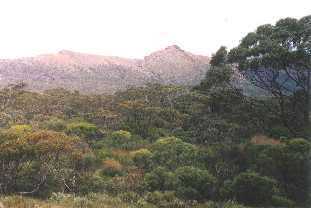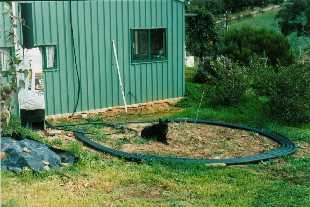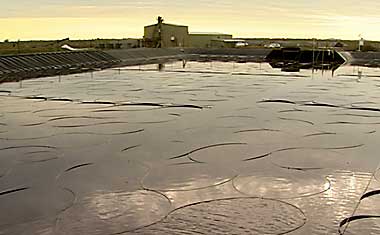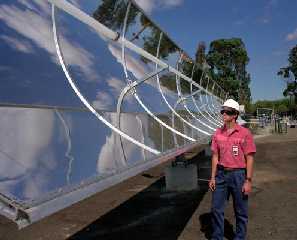Introduction
Earth is the only planet we have. There has long been talk of the colonisation of other planets, but if that is ever going to be possible it is many decades away. Consider for a minute; Mars is the solar-system planet with the most Earth-like environment, yet it is much more hostile than Antarctica or the driest desert on Earth – Mars is certainly more hostile to human life than the sea-beds on the shallower parts of the continental shelves; if the colonisation of Mars is possible, why have we not colonised these areas?There may be more hospitable planets near other stars, but moving large numbers of people and large loads of materials over that sort of distance is beyond our abilities for the foreseeable future.
Almost all my Internet pages relate in one way or another to either ethics or the environment (and the two are closely linked, a society cannot be ethical without protecting its environment for future generations). Why have I written this page? I'm not at all sure; it is certainly not a summary of all else.
Fossil fuels
The burning of fossil fuels is widely recognised as the main cause of climate change, ocean acidification, ocean warming and sea level rise. The air pollution from the burning of fossil fuels kills millions of people world-wide each year.Humanity is consuming fossil fuels about a million times faster than the rate at which they form. The world if facing the end of coal-burning for financial reasons as well as environmental imperatives. South Australia has gone from negligible wind and solar power in early 2003 to 68% in 2022. The whole world can do as much or more if we can find the will.
The earth's easily and cheaply accessed petroleum supply has largely been
used up; the remaining reserves are beneath the deep oceans, in the arctic, or
in tar sands, coal seams, or oil shales.
Accessing these comes with huge environmental risks and often even greater
greenhouse penalties than conventional oil.
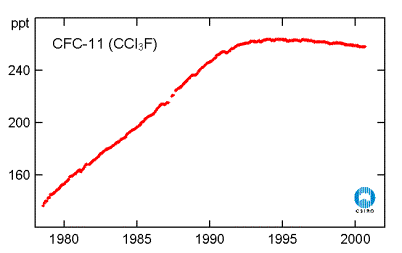
CFCs
We know that our activities can have deleterious effects on the atmosphere, our experience with chlorofluorocarbons, the ozone 'hole', and ultraviolet radiation taught us that. We know from that experience that, at least in some cases, we can turn around the damage if we make the effort.The graph on the right, from the Australian Commonwealth Scientific and Industrial Research Organization (CSIRO), shows the rise in atmospheric CFCs, then the beginning of the fall.
As a civilization we are destroying our forests, causing the greatest rate of extinctions for many millions of years, causing salinisation and desertification of farmland at very high rates, mining all the easily accessible minerals with no consideration for those who will come after us, and polluting our air, water and soils.
|
Mining
The photo on the left shows an iron mine in the Middleback ranges in South Australia. The rocks are over a billion years old, the hill has stood for perhaps one hundred million years; it will be destroyed in a fraction of my lifetime.It is true that it would be very expensive to change to a way of life that is completely sustainable. It is also true that we could go a long way toward that goal without much effort at all. But our leaders are too busy sacrificing all that is valuable on Earth to Mammon to adopt a precautionary approach.
To a large extent it is not so much people who are running the world, it is the capitalist system, which seems to react amorally to any opportunity that can turn a profit. It is up to us to reign it in and turn our use of the biosphere to one that is sustainable. Moneyed interests dominate our governments; they will not change unless they are forced to. The great majority of people can see the damage that is being done, but they are either too apathetic or too shortsighted to try to stop it. Three quotes are appropriate here:
|
|
- "Every nation has the government it deserves." (Joseph de Maistre)
- "If you think you are too small to make a difference, you've never been in a room with a mosquito." (Annita Roddick)
- "I am a citizen, not of Athens or of Greece, but of the world." (Socrates)
|
Ocean acidification
Wikipedia has an extensive article on the subject.
| ||
|
Rising atmospheric carbon dioxide (CO2), primarily from human fossil fuel combustion, reduces ocean pH and causes wholesale shifts in seawater carbonate chemistry. The process of ocean acidification is well documented in field data, and the rate will accelerate over this century unless future CO2 emissions are curbed dramatically. Acidification alters seawater chemical speciation and biogeochemical cycles of many elements and compounds. One well-known effect is the lowering of calcium carbonate saturation states, which impacts shell-forming marine organisms from plankton to benthic molluscs, echinoderms, and corals. Many calcifying species exhibit reduced calcification and growth rates in laboratory experiments under high-CO2 conditions.On 2012/10/08 Google Scholar recorded 503 citations to this paper.
More on ocean acidification
Ken Caldeira and Michael E. Wickett published a paper titled 'Anthropogenic carbon and ocean pH' in the prestigeous science journal Nature, Volume 425, 2003/09/25. They stated "The coming centuries may see more ocean acidification than the past 300 million years".Extracted from Environmental Science and Technology online (no longer available):
"Average oceanic pH has decreased from a pre-industrial level of 8.16 to 8.04 today (Science 2004, 305, 362-366; 367-371). If the CO2 concentration doubles from present levels by 2100, as some models predict, then the pH could drop to a level between 7.6 and 7.8."
Ocean acidification will have an adverse effect on marine organisms. In particular it increases the solubility of the calcium carbonate that makes up the shells of many marine animals; making it harder for them to build their shells. Corals, whose skeletons are calcium carbonate, may be adversely effected by acidification as well as by the global warming that leads to coral bleaching.
Ocean acidification is linked to climate change, ocean warming and sea level rise.
Links relating to ocean acidification
There are a huge number of scientific paper dealing with ocean acidification, far too many for me to cite here, see Google Scholar or Google Scholar, Australia.Ivan Nagelkerken, Associate Professor, Marine Biology, University of Adelaide, wrote a piece titled "The oceans are changing too fast for marine life to keep up" on The Conversation, 2015/10/13.
|
|
|
Travelling by bus
Writing a piece on this occurred to me while waiting for a bus on the Old Coast Road in Mandurah, Western Australia, where I have lived since February 2022. At the particular place and time of day the busses came by every half hour.Out of curiosity I counted how long it took for a hundred cars to go by: 3 minutes, 19 second. So in the half hour between busses about 900 cars would have passed by. I've noted previously that the average occupancy of the cars is about 1.2 people per car, so those 900 cars would have been carrying about 1100 people.
|
So let's do some theorising:
- If 50% of the people in those cars could travel by bus instead of driving and did travel by bus that would be 550 people every half hour.
- Let's suppose it would be difficult for half the people in those cars to travel by bus, let's suppose that 20% would be a more reasonable figure, that's 220 people every half hour.
- Even if only 10%, that's 110 people.
On another of my pages you can calculate the emissions your car will produce by the distance you travel. For this exercise I calculated that supposing driver only, a medium sized car and a ten kilometre journey three kilograms of CO2 would be released into the atmosphere. So for those 110 people every half hour that would be 300 kilograms less CO2 from cars for that journey.
I then calculated that the CO2 released due to those 110 people travelling by bus would be 44 kilograms, a reduction of 256 kilograms every half hour just from the traffic on that road.
Obviously the road that I was on is a busy one. And Mandurah is a fast growing city. The amount of traffic on that road is already problematic in the rush hours, what will it be like in ten years time? A duplication of the Estuary Bridge on that road that is a particular bottleneck is planned at a cost of $110 million. A 10% or better yet a 20% reduction in the number of cars would be very significant, that bridge duplication could be delayed for years.
But will enough people ever be motivated to bother? It's easier to just get into the car and drive.
A toll to pay for the new bridge and to encourage people to use the busses?
Would making the users of the Estuary Bridge pay for the duplication with a toll encourage some of them to use busses instead? The Minister for Infrastructure's Internet site has stated that "The bridge is used by more than 30,000 vehicles daily" and the cost of duplication has been given as $110,000,000. So a simple calculation shows that a toll of $9 per vehicle would pay for the new bridge in one year (or $4.50 per vehicle for two years, etcetera).|
|
Commuting by bicycle
I wrote this bit about Adelaide, the capital and largest city in the state of South Australia, but it could apply to most Western cities.Recently a friend told me that she rides her bike to work most days; by bicycle she takes 30 minutes against 45 minutes by car. Then I read a suggestion by the Government's ideas man (Herbert Girardet) suggesting that Adelaide could be greatly improved if there was more pedestrianisation (sic) and a lot more cycling.
It struck me how much Adelaide would change for the better if most of the commuters either rode bikes or walked to work.
- The rush hour traffic congestion and the smogs would go;
- The people would be fitter, leaner and healthier (heart disease statistics in particular would fall markedly);
- The air would be nicer to breathe;
- The pan-Adelaide traffic roar would be reduced;
- Those who made the change would save a heap of money;
- Money that is currently spent on roads could instead go into hospitals or education;
- Greenhouse gas production rates, consumption of fossil fuels, and the number of road injuries would be greatly reduced;
- And the place would just generally be more pleasant and enjoyable.
Perhaps I'm dreaming, or perhaps it could happen?
A page that is related is on the advantages of reducing vehicle speed limits.
|
|
|
Overpopulation
|
Is the world overpopulated?
If there were far fewer people in the world then there would be no need for starvation or malnutrition. We could all make a living by subsistence farming if no other course was available to us. In fact, there is no unused land for those who are malnourished to set up subsistence farms.A hundred people defecating in a large river would be insufficient to cause that river to become polluted; the other life forms, bacteria, fish, invertebrates, etc., would keep the human-introduced toxins and harmful micro-organisms to levels that are harmless. If the sewage of a million people is dumped into a large river it will overload the ability of the river to clean itself.
Many of the Earth's rivers are polluted with sewage. Production of pollutants is, everything else being equal, proportional to population. If there were 600 million people on the Earth rather than six billion, and living standards were the same as today's, greenhouse gas production would be little problem.
If there were insufficient people in the world then people would be valuable. In 1850 an agricultural slave cost $30 000 (today's dollars) in Alabama, but today an equivalent slave laborer can be had for around $100. (Scientific American, April 2002.) World-wide there are millions of refugees who have to live in camps because no nations want them.
If there were one tenth as many people on the Earth then farmers would be able to farm only the best land; the marginal land could be left for nature. If there were only one tenth as many people we would not be facing the loss of most of the world's forests within a few decades, and we would not be nearing the end of petroleum reserves.
|
|
How to limit population?
|
In most nations people are permitted to have as many children as they choose. (Not all, Singapore provides strong disincentives for large families.) It seems generally accepted that there is an unwritten right to produce any number of children. This was acceptable when there was a perceived need for more people, but it should have been abolished long before now.
It seems to me that, ideally, the whole world should follow the Chinese example of one child per family until world population falls to, perhaps, one billion. This would be a very difficult law to get people to accept, so perhaps a limit of two should be aimed at first.
Several religions encourage the production of large families. This would be a major impediment and it is difficult to imagine how it might be changed in the time we have available to us before overpopulation brings about a disaster. (I have discussed religion under Ramblings on false beliefs.)
What population level for Australia?
There has recently been some discussion over the optimal and sustainable population level for Australia. At present there are about 19 million people in Australia. There have been suggestions that anything up to 40 million is desirable.
I would hold that no more than 10 million is the maximum
desirable population level. Why?
|
Fuel
|
Oil and gas peak production of oil is expected to come in the near
future. When world oil yields start to decline gas yields will not be
far behind. In general Australia relies very heavily on the unsustainable
burning of fossil fuels for its energy.
What are the sustainable alternatives?
Nuclear fission could be a partial medium-term (100 years) solution, but it comes with risks, is not likely to be politically acceptable in Australia in the foreseeable future, and is of no use for powering transport at the present state of technology. Nuclear fusion may become feasible in the future and if so could become a medium-long-term solution, however, it is not yet available. Wind/hydro/biomass Wind does not blow all the time; while hydro and biomass can be used to generate electricity sustainably they would not be sufficient for Australia's current population, but may be sufficient for a considerably reduced population. |
|
Agriculture
|
The forms of agriculture currently practiced in Australia are unsustainable
for several reasons. Reducing the nation's population could proportionally
reduce the problems mentioned below.
Large energy inputs required Not so much for tilling the land but for production of, in particular, the high level of nitrogenous fertiliser required; also for production of agricultural chemicals. Phosphate cycle At present in Western agriculture phosphate is mined, processed, and applied to the land. It is then, in a fairly short time either removed from the land with the agricultural produce, or is leached from the soil; either way it is not returned to the soil. The end of this system comes when the readily accessible phosphate rocks are mined out, and this time might not be far off. Pollution from excess nutrients Modern agricultural practices result in some of the nitrates and phosphates applied to the land being washed into waterways and causing problems such as toxic algal blooms and changing ecological balances. |
|
Pollution
|
Smoke
Currently, as mentioned above, fossil fuels are the primary source of our
energy and this is plainly unsustainable. Wood fires are a practicable
alternative for home heating, however, smoke is a problem in some urban
areas. Perhaps the real problem is that urban population densities have
become too great; smoke from fires
is, after all, a very natural part of the Australian environment. A lower
Australian population level could be the answer.
A similar argument applies for several other forms of pollution. |
|
Biodiversity
|
Australia's biodiversity has declined since Man came and especially
quickely since white settlement. If our population was reduced we could
put more land asside to try to stop the loss of species.
|
|
|
Solar Water heating
|
Burning firewood is not the only environmentally friendly way to heat water. In Australia in the warmer three-quarters of the year solar water-heating, using commercially available heaters, is quite practical. I have used one at my home at Crystal Brook for 25 years. Several times the cost of the heater must have been saved on electricity bills over this time, not to mention the reduction in greenhouse gas production.
A simple solar water-heater can be made by laying out about 30m of 50mm black polythene pipe in a sunny position. I use this method as an alternative to the wood-fired heater at Elysium.
This simple water-heater works best on warm, calm, sunny days. It will
provide water warm enough for a shower on a sunny calm day of 20°C, or on a 28°C day if there is a breeze. Covering the pipe with glass to stop air
circulation (produce a greenhouse effect!) would improve its efficiency.
Water can circulate by convection on a warm day so that the water in the tank on the left is heated. The tank is not insulated, but it will stay warm for several hours after the sun stops shining on the pipe coil.
|
On a 32°C day in December (Southern summer) with a light breeze I measured the temperature of the water in the tank at 50°C just after the sun had passed the zenith.
The second photo shows the valves on solar/wood-fired water heater
It's a bit of a plumber's nightmare, but different configurations of opening and closing the valves allow:
- Water to be drawn direct from the pipe coil to the shack;
- Convective flow from the coil into the hot water tank;
- Water to be drawn from the hot water tank to the shack;
|
Solar ponds
This method of heating water is not suitable for household hot water. It is a method of producing industrial energy. I believe it may have potential for use in desalination of water in areas such as South Australia's Eyre Peninsula, where potable water is scarce. See Water which particularly deals with Eyre Peninsula.
RMIT University, Geo-Eng Australia Pty Ltd and Pyramid Salt Pty Ltd have developed a commercial solar pond in north-central Victoria. Here the heat from the solar pond is used to dry salt. They have calculated that northern Victoria can produce process heat (40 - 80 oC) for a wide range of applications at an average cost of about between $10 and $15/GJ.
|
|
|
Recycle or reuse
Glass Forever states that up to 18% of the energy required to make new glass bottles is saved by recycling old glass. Other pages on the Net indicate even more energy might be saved by recycling.
|
In the developed countries we are encouraged to recycle, and I don't doubt that recycling is better than dumping in a land fill, but how much better again would it be if we reused rather than recycled?
In a World in serious trouble with greenhouse/climate change it is
unacceptable to smash a bottle, remelt the glass, and recast a new bottle rather than cleaning out and reusing the old bottle.
|
|
Plastic
There is not much point in me writing at any length on plastic other than to say that pollution from waste plastic is a huge environmental disaster. I would like to see a heavy tax placed on the production of all plastic to disencentivize its use.
I'm sure there are many excellent sites on the internet that provide information on the environmental damage caused by plastic waste.
A good place to start would be Wikipedia's article on plastic pollution.
|
The consequences of our actions
I have believed for many years that we should always consider the consequences of whatever we do. Humans are intelligent animals, although we do have to make an effort to use that intelligence. It seems that many have got into the habit of just drifting through life as far as the consequences of our actions are concerned. Some of us, apparently many of us, don't care what fall out there is from what we do.It is a great pity for those who do care, that so many don't. We all have to suffer jointly many of the consequences of people's actions as individuals. In particular, the future of all life on Earth is impacted by the emissions that each and every one of us is responsible for individually.
We have choices in what we do all the time. For the sake of our shared world we should all consider how we make those choices, not just selfishly, but at least with a thought to altruism.
|
End word
At the time of writing there seems little hope that humanity will stop or even greatly slow its relentless march toward destroying its environment.Should we despair? No, I believe that those of us who want to protect the world should continue trying. We who do try, as individuals, will be forgotten, but perhaps there will be some record that some people tried. Giving up is not an option.
Go outside on a clear moonless night and look at the stars. (Get away from the light pollution of towns and cities if you need to.) There is the Universe, infinitely bigger than our so badly damaged little planet; humanity has not harmed the Universe, humanity is incapable of harming it.
The Universe and the Earth are billions of years old. The Earth has suffered catastrophes before, it has recovered every time, it very likely will recover from the human catastrophe. Even should it not, there must be other worlds out there supporting other life. Humanity is greatly damaging this little speck, and it may take millions of years for it to recover, but what are millions of years among billions of years and one speck among trillions of specks?
For a time, a mere moment in the life of the Universe, life on the Earth evolved to produce an intelligence capable of understanding how it and its home came to be. That is a wondrous thing.
